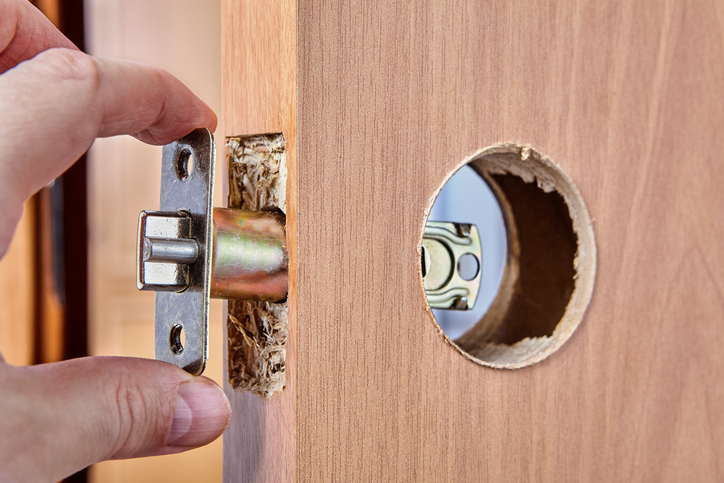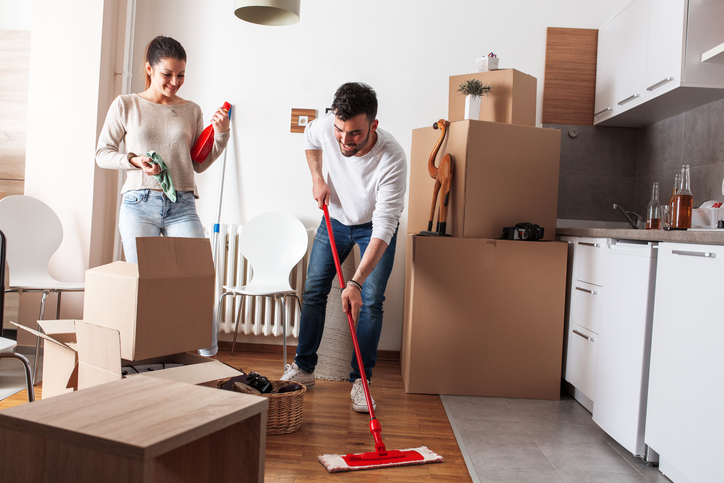Congratulations—you’ve bought a house! Whether you’re a proud first-time home buyer, adding more room for your growing family, or helping a loved one settle down for retirement, every new home comes with a variety of household projects to tackle after you sign your contract.
If you’re not sure how to prioritize home projects and tasks, Compass Self Storage is here to help. We’ll dive into what to do after buying a house, from changing locks to putting your personal touch on your living space.
How To Prioritize Household Projects and Tasks
Processing everything you need to get done after buying a house, outside of moving your belongings into it, can be overwhelming without a plan. Instead of winging it, create a running list of things to do after buying a house. The planning process looks different for everyone, but we recommend creating a spreadsheet with a column for each of the following factors:
- The name of the household project or task (e.g., “Change locks”)
- The date you need or want to complete the project or task
- Tools and materials you’ll need to complete the project or task
- The exact or estimated cost of the project or task
- How long you think the project or task will take
Think of this spreadsheet as a SMART goal tracker. You want your household projects to be specific, measurable, achievable, relevant, and time-bound. Additionally, the better you plan out your to-do list, the better you can prioritize it and make the most of your busy schedule as a new homeowner.
What Are the Most Important Things To Do After Buying a House?
What to do after buying a house depends on several factors, such as the existing condition of your new home and your available budget and time. Whether your house is turn-key or a fixer-upper, there are several projects and tasks every homeowner can and should do.
Secure Your Home as Soon as Possible

Even if the previous homeowner hands over every key to the house, you can never be completely sure that there aren’t additional copies floating around.
Changing locks after buying a house addresses security concerns and is a cost-effective household project that you can do on your own or hire a professional. If you have a garage door opener with a keypad or access code, you should change the PIN for even more peace of mind.
In addition to changing your locks and codes, consider other security measures, such as installing a security system, adding floodlights near your exterior doors, and using a doorbell video camera.
Check the Dates on Smoke and Carbon Monoxide Detectors
It’s critical to check the dates on smoke and carbon monoxide detectors, especially after buying an older house. You should replace smoke detectors every 10 years, so if the dates on your smoke detectors indicate they’re older than a decade, they should be swapped out immediately.
Carbon monoxide detectors should be replaced every seven to 10 years, depending on the brand. Some carbon monoxide detector brands, such as Kidde, have an end-of-life warning built into their alarms to notify you if it’s time to replace them.
If you can’t find the dates on your smoke and carbon monoxide detectors, replacing them should be a priority—but simple—household project.
Deep Clean Your House

Once you’ve addressed the immediate security and safety concerns for your new house, the most straightforward household project to tackle next is deep cleaning. Like other to-do items, the process of deep cleaning will vary depending on the condition of your home, but we recommend focusing on a few key areas:
- Windows. Pay extra attention to the window sills and tracks to remove any grime.
- Ceiling fans and lights. Dust and wipe down your ceiling fan blades and brush any spider webs or dust on lightbulbs or light fixtures.
- Walls. Believe it or not, your walls need occasional cleaning, too. Use a damp cloth to wipe down the walls and baseboards—this task is especially helpful if you plan to paint.
- Floors. There’s a lot of foot traffic in a new home, from family and friends to inspectors and movers walking around. Sweep and mop your hardwood floors and vacuum and shampoo your carpets to pull out any deep-seated dirt.
- Bathrooms. Scrub down toilets, sinks, showers, and bathtubs to remove grime and germs. You should even consider replacing the toilet seats if they have noticeable wear and tear.
- The kitchen. From crumbs around the pantry to food stains on the stove, microwave, or refrigerator, refresh your new kitchen by cleaning it out before you settle into your living space.
Other Household Projects To Do After Buying a House
When you have the most important tasks for security, safety, and cleanliness taken care of, you can move on to the more fun household projects that let you personalize your living space.
From elevating your curb appeal to changing your master bedroom to your favorite shade of yellow, the following household projects may take more time, energy, and tools. Still, the sooner you take care of them, the sooner you can make your house a home.
Refresh Your Landscaping and Start a Garden

Spruce up your outdoor space by starting a garden this summer. While creating a garden from scratch can be time-consuming, gardening is a relaxing hobby for many people that comes with plenty of satisfaction.
This household project will vary based on when and where you buy your house. If you buy a property in Philadelphia in the fall, refreshing your landscape could look like raking up leaves, putting down mulch, and pruning perennials before the first frost.
Alternatively, if you’re moving into a new abode in the Atlanta area during the late spring, your focus may be a spring clean-up, complete with planting warm-season plants or flowers, cleaning up weeds, or figuring out a watering system for your budding garden as you head into summer. Some of the best plants to plant in June include celery, sweet potatoes, sunflowers, California poppies, Amaranthus, basil, and rosemary.
Whatever your landscaping plan looks like, some essential gardening tools include:
- Gloves
- Pruning shears
- Garden forks
- Hand trowel
- Spade
- Rake
- Garden hose, watering can, or watering wand
- Wheelbarrow or wagon to carry other tools around your yard
Install New Fixtures
Installing new light fixtures is another great household project to tackle after buying a house. A new overhead light in the kitchen, a couple of accent lights in your bathroom, or under-cabinet lighting can help you save energy, personalize your space, and even increase the future value of your home. If you decide to go the DIY route, you’ll need the following tools:
- Wire strippers
- Voltage tester
- Four-in-one screwdriver
- Wire nuts
- Safety glasses
- Utility knife
- Electrical tape
- Pliers
- Mounting brackets and screws
Are you building your homeowner toolkit from scratch? Discover some of the best tools for homeowners so you can start your DIY journey.
Update Your Balcony or Patio
Take advantage of the warm weather by enhancing your outdoor living space. Start by cleaning and decluttering your patio or deck. You can utilize a self storage unit to store any off-season items that you don’t want to get rid of. Next, you can add comfortable seating, outdoor rugs, potted plants, or a vertical garden to make your space feel more cozy. Finally, install string lights to set a relaxing ambiance for those long summer evenings.
Paint Walls Around Your Home
One of the quintessential things to do after buying a house is painting the walls, either to refresh and touch up the existing colors or to put your own spin on them. Outside of the paint, brushes, and rollers, you’ll need to grab a few other tools and materials, such as:
- Paint tray
- Drop cloths
- Painter’s tape
- Step ladder or extension pole
If you’re able to hold off on moving in or unpacking your belongings until you’re done painting, it can simplify the process by creating more working space and minimizing any risk of paint landing on your furniture.
Keep Your Household Projects Organized With Compass Self Storage
Even the smallest household projects can result in some dust and clutter, and the larger ones can put entire rooms out of commission for weeks or months. It’s tricky to figure out the logistics of certain projects, which can even get in the way of the project happening.
Fortunately, self storage is a perfect companion to finally getting that project off the ground, with helpful benefits such as:
- Month-to-month leases. Not sure how long your household project will last? That’s not a problem with self storage, which is rented on a monthly basis for maximum flexibility.
- Affordable rates and a variety of sizes. Self storage is affordable compared to other storage solutions, and you can rent the perfect-sized storage unit for your needs.
- Climate-controlled storage availability. Extreme heat can cause damage to items that are intended to be inside all the time. Climate-controlled storage units keep them cool.
Even after you wrap up your many things to do after buying a house, self storage is perfect for taking on larger renovation projects or tucking away holiday decorations and other belongings you need but don’t use actively.
Give yourself another helpful resource for your home project planning with our team—find a Compass Self Storage facility near you today!
